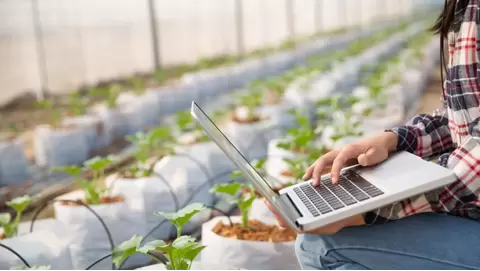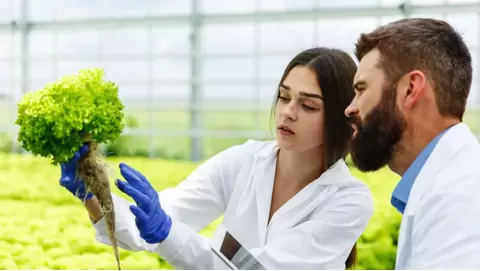
Sustainable Farming Innovations: BioLine, PhycoTerra, Blacksmith, and Aquabella Leading the Way
- Key Companies Leading Innovation: BioLiNE, PhycoTerra, BlackSmith BioScience, and AquaBella.
- Focus Areas: Soil health, crop yield improvement, water management, farm management, and reducing chemical inputs.
- Technological Advancements: Microbial solutions, organic fertilizers, regenerative practices, and AI-powered farming tools.
- Environmental Impact: These technologies prioritize sustainability by improving soil fertility, water quality, and plant resilience.
Sustainable farming technologies are transforming the agricultural landscape, resulting in improvements in crop yields and quality and solutions that emphasize environmental health and resilience. As the world faces climate change, soil degradation, and water scarcity, the need for innovative and sustainable farming practices has never been more urgent. Modern farmers increasingly rely on innovative technology that makes their operations more sustainable by improving soil health, optimizing water management, and decreasing reliance on chemical inputs.

Businesses such as BioLiNE, AquaBella, BlackSmith BioScience, and Phycoterra lead these innovations by offering sustainable agricultural solutions. These innovations in microbial technology, organic fertilizers, and regenerative practices are helping farmers grow more with less, paving the way for an agricultural revolution that nurtures both the earth and the people who depend on it.
The Role of Sustainability in Modern Agriculture
Nowadays, sustainability is an essential part of modern farming. Due to the rising global population, agricultural systems are being increasingly demanded to maximize output while decreasing input costs. Sustainable agriculture aims to increase harvests without negatively impacting the environment.
Key practices include:
- Soil health management: Soil health management, which aims to keep soils rich in nutrients, includes organic fertilizers, crop rotation, and cover crops.
- Water conservation: Water conservation measures aim to reduce water use without sacrificing agricultural yield.
- Biodiversity: Promoting pollinators, natural pest control, and disease resilience via cultivating various ecosystems on farms is biodiversity.
Sustainable methods are advantageous for farmers and the environment by promoting long-term production and better ecosystems.
BioLiNE: Boosting Crop Health and Yield with Advanced Fulvic Acid Solutions
The high-performance fulvic acid products developed by BioLiNE Company have transformed farming by sustaining and enhancing plant development throughout the growing season. BioLiNE's solutions have a constant and proven record of increasing crop health, production, and stress tolerance, which has led farmers to trust them for more than 2.5 million acres of on-farm application.
How BioLiNE Elevates Crop Performance
The fulvic acid products made by BioLiNE increase plant vitality, improve water and nutrient usage efficiency and allow plants to attain their full genetic production potential. Some significant advantages are:
- Rapid Emergence & Growth: BioLiNE encourages uniform and rapid seedling emergence, which leads to rapid growth.
- Efficient Nutrient Use: Improves the absorption and transport of nutrients, making them more accessible to crops.
- Conservation of Water: Better use of water is especially important in places that are prone to droughts or have limited irrigation options.
- Increased Microbial Activity: BioLiNE invigorates good soil bacteria, which leads to a balanced soil ecology.
- Stress Resilience: Makes crops more resistant to heat, drought, and pests by boosting their natural defenses.
BioLiNE's technology helps plants thrive by maintaining an optimal electrochemical balance within plant cells. Its Dynamic Nutrient Exchange process enables nutrient transport, ensuring crops can absorb essential nutrients from the soil efficiently and effectively, leading to better yields.
PhycoTerra: Revitalizing Soil and Crops
When it comes to soil health and agricultural productivity, PhycoTerra is revolutionizing the field. For optimal plant development, water retention, and nutrient uptake, PhycoTerra awakens dormant bacteria by harnessing the power of microalgae, creating an ideal food source for the soil microbiome. In their never-ending quest to develop healthier, more sustainable agricultural systems, these microbial communities improve crop resilience, soil structure, and yields.
Key Products
Product | Purpose | Benefit |
PhycoTerra Soil Microbial Food | delivers a superior, balanced meal to the starving, dormant microbes in the soil. | activates the soil microbiome to improve soil structure and quality, increase water productivity (up to 10%), optimize nutrient uptake, and support post-harvest residue management – all benefits contributing to improved, sustainable yield and return on investment (ROI) performance. |
PhycoTerra ST - Seed Treatment | Provides nourishment directly to seeds to promote healthy seedling growth. | Activates beneficial microbes critical to a seed’s eventual germination, early vigor, root-structure development, and stand establishment. PhycoTerra® ST helps unlock your seed’s potential and delivers increased yield results. |
PhycoTerra Organic - Soil Microbial Food | Activates the soil microbiome (up to 33x) by delivering a superior balanced meal to dormant, native microbes. | Activates the soil microbiome to improve soil structure and quality, increase water productivity (up to 10%), and optimize nutrient uptake – all benefits contributing to improved, sustainable yield and return on investment (ROI) performance. |
PhycoTerra FX - Foliar Microbial Food | Improves the unique microbiome of plant leaves (phyllosphere) with an inert microalgae superfood. |
|
How Technology is Shaping the Future of Farming
Technological advancements are reshaping the agriculture industry by equipping farmers with resources that boost farm productivity, save expenses, and enhance crop quality. Innovations in data analysis, automation, and precision agriculture will have far-reaching effects on the agricultural industry in the future. Here's how technology is transforming farming:
- Innovative Farming Tools: Sensors, drones, and satellite technology offer real-time data, allowing farmers to monitor soil health, weather conditions, and plant growth.
- Automation: Automation results in reduced labor costs and increased efficiency. It uses robotics and AI-driven gear to expedite planting, harvesting, and watering.
- Intelligent decisions: AI may assist farmers in making well-informed choices on the distribution of resources, control of pests, and rotation of crops.
Thanks to these advancements, farming is now more accurate, environmentally friendly, and flexible.
AquaBella: Microbial Solutions Transforming Agriculture and Water Quality
AquaBella Company's innovative microbial products can improve soil fertility, water quality, and agricultural output. Their solutions aim to assist farmers in optimizing their farming systems while safeguarding the environment. This is achieved through the utilization of natural microorganisms. Whether you want to improve soil quality or purify water, AquaBella has you covered. Their products revolutionize environmentally sustainable agriculture.
TerraBella: Using Natural Microbes to Promote Plant Growth
Try TerraBella, a potent biostimulant root inoculant for plants grown in soil or water. The dynamic combination of beneficial, naturally occurring microorganisms introduced into the soil or growth medium by TerraBella promotes more excellent nutrient absorption, resulting in:
Higher Crop Yields: It encourages plants to absorb nutrients more efficiently, which makes them stronger and more productive, which in turn increases crop yields.
Improved Plant Quality: Enhancement of Plant Quality: Facilitates the uptake of vital nutrients and minerals, leading to better plant health and a more attractive plant in general.
Versatility: Useful in both conventional soil-based farming and innovative hydroponic systems because of its adaptability.
Microbial Solutions for Healthier Soil and Better Crops
Microbial solutions are innovative in environmentally friendly farming practices because they boost crop yields and soil health. Soil health and crop resilience can be improved when farmers learn to harness the power of beneficial bacteria rather than industrial fertilizers and pesticides. Some significant advantages are:
- Fertility of the soil: Organisms such as bacteria and fungi decompose organic materials, releasing nutrients vital for plant development.
- Improved water retention: The need for water as often is decreased because certain bacteria aid the soil in retaining moisture.
- Pest control: To manage pests, beneficial bacteria can reduce the need for chemical treatments by outcompeting dangerous diseases.
By using microbial solutions in their agricultural methods, farmers may build a healthy ecosystem that benefits plants and the environment.
BlackSmith BioScience: Harnessing Microbial Power for Sustainable Agriculture
BlackSmith BioScience is a trailblazer in sustainable agriculture. It leverages beneficial microorganisms to optimize plant fertility, soil health, and pest management. Its microbial solutions help reduce dependency on chemical fertilizers and pesticides, promoting healthier crops and sustainable farming practices.
BlackSmith BioScience Product Range
Product | Key Ingredients | Primary Benefit |
Armory SP | Bacillus, Streptomyces species | Enhances plant growth and yield |
MegaPhos SP | Bacillus megaterium | Improves phosphorus availability for better crop growth |
Nitryx SP | Nitrogen-fixing microorganisms | Converts atmospheric nitrogen into plant-usable forms |
NoFly WP | Isaria fumosoroseus (fungus) | Biological insecticide for pest control |
Tenet WP | Trichoderma fungi | Controls soil-borne diseases like Fusarium and Phytophthora |
WarHammer | Chitosan (natural polysaccharide) | Stimulates seed germination and root growth |
The Bottom Line
Sustainable technologies spearheaded by businesses such as AquaBella, BioLiNE, PhycoTerra, and BlackSmith BioScience will determine the course of agricultural development in the future. Innovative technologies from companies like BioLiNE, PhycoTerra, BlackSmith BioScience, and AquaBella are crucial in enhancing soil health, boosting crop yields, and improving water management, ultimately contributing to global food production and strengthening food security for the future. These technologies can significantly reduce greenhouse gas emissions from traditional livestock farming while enhancing the efficiency of indoor vertical farming systems.
In today's agricultural practices, sustainability is essential, not optional. These businesses assist farmers in meeting the increasing demand for food while reducing their impact on the environment through regenerative methods, improving soil quality, and fostering biodiversity. With the incorporation of new technology like smart agricultural tools and automation, agriculture is becoming more productive, cost-effective, and eco-friendly. This is truly transforming the business.
Disclaimer: This material is for informational purposes only and should not be relied on for legal, medical, financial, or any other form of professional advice.
Sources:
National Agricultural Library - Sustainable Agriculture
U.S. Department of Agriculture - The Importance of Pollinators
National Library of MedicineNational Library of Medicine - Agricultural sustainability: concepts, principles and evidence



.jpg?1733317579860)
.jpg?1733317658201)





















